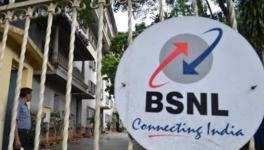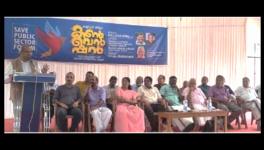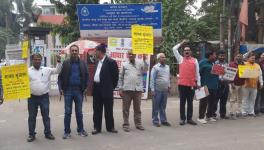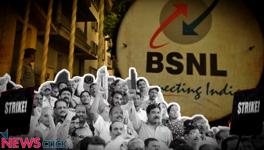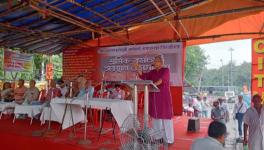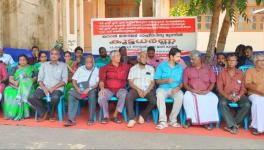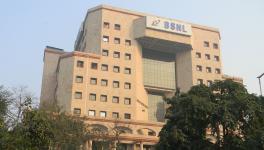Unions to hold Dharna on July 16 Demanding Revival of BSNL Instead of Retrenchment of Workers
The employees and contractual workers in Bharat Sanchar Nigam Limited (BSNL) are all set to organise simultaneous dharnas at the Corporate office and headquarters of various circles on July 16 demanding an immediate payment of wage arrears to the contractual workers. The wages of the contractual workers have not been paid since January this year.
The protest call was given by the BSNL Employees Union (BSNLEU) and BSNL Casual Contract Workers Federation (BSNLCCWF)
Ever since the contractual workers haven’t been paid their dues, their financial condition has pushed them to take drastic steps to survive. As a result, five such workers in West Bengal were forced to commit suicide. Though the unions have raised this issue before the management earlier as well, workers are still waiting to receive their pending salaries. It has been over six months now.
Besides, the management had decided to retrench 30 percent of the contractual workers in the name of cutting down the expenditure in the BSNL- which is crippling down with liquidity crunch and poor policies of the BJP-led centre. The contractual workers in Western Uttar Pradesh have been waiting for the wages for nearly a year now.
“In a few circles, a section of contractual workers were being laid off,” said VAN Namboodiri, president of BSNLCCWF. The retrenched contractual workers have also not been paid their wages so far. “There is no clarity about the pending wages of the retrenched workers. Apart from this, the upper age limit of the contractual workers has been reduced to 58 from 60,” said Namboodiri.
Read More: Centre’s Move to Introduce VRS in BSNL A Step Towards Privatisation, Says Union
For the government, reducing the workforce by retrenching contractual workers is a method to lower the expenditure and improve efficiency. The BSNLEU deputy general secretary Swapan Chakraborty had said that the BSNL had started running into losses since 2009 after the tenders were canceled and the loss could simply be attributed to the policies of the consecutive central governments (the then United Progressive Alliance and now Modi Government). “Between 2000 and 2009, it was making profits of around Rs 10,000 crore annually and at that time the number of employees were higher than the current number of employees.” So, clearly, reducing the number of the workforce may not improve the efficiency of BSNL. At present, BSNL has a strength of about 1.68 lakh regular employees.
Along with the demands of “immediate payment of pending wages to contractual workers, no retrenchment of contractual labourers and no cut down the working days,” the unions also demand immediate government action for the revival of BSNL.
It appears as though the public sector unit, BSNL, has always been on the hit-list of centre. “Earlier NITI aayog, the think tank of the Centre had added it to the list of loss-making PSUs. They have also proposed the closure of BSNL instead reviving the ailing PSU,” said Chakraborty.
However, it is important to note that the public sector service provider has expanded its customer base despite the financial crisis crippling the company. As per BSNLEU, in 2017-18, the number of mobile customers of BSNL has seen an 11.5 percent growth with a clear upper hand over private operators like Airtel, Vodafone and Idea which have seen an increase in their customer base by 9.5 percent, 3.8 percent and 3.2 percent respectively.
Like every other telecom operator, the predatory pricing of Reliance Jio has affected the performance of BSNL. Instead of helping the state-owned BSNL, previous stint of the Modi government had explicitly favoured Jio. On the other hand, government's policies were clearly dismantling the BSNL.
Read More: BSNL Crisis Continues: Over 1.68 Lakh Employees Yet to Receive Salary
According to BSNLEU, the “step-motherly attitude” which was being practiced by the consecutive governments, continues even today. Private operators were given licenses for providing mobile services way back in the year 1995, whereas BSNL got it only in 2002. Further, private companies rolled out their 4G services almost five years ago. However, BSNL is still waiting for the allocation of 4G spectrum. “This is how the policy decisions of the government have seriously hampered the growth of BSNL. The government’s stand of not allocating 4G spectrum to BSNL is clearly to help private operators,” said Chakraborty.
With all the limitations, the company has been performing decently and the deeper financial crunch has arisen in between. Following this, BSNL approached the Department of Telecommunication (DoT) seeking permission to take loans to resolve the issues.
“DoT is not allowing BSNL to take bank loans to meet its operational expenditures. DoT only allows BSNL to take bank loans for capital expenditure. The stringent conditions imposed by DoT restricts the operations of BSNL,” Chakraborty added.
However, the total debt of BSNL which amounts to Rs 13,900 crores is far less than that of the private operators. The debt of Vodafone is Rs 1.2 lakh crore and debt of Airtel is Rs 1.13 lakh crore. The debt of Jio is about Rs 2 lakh crore.
Unlike other private operators, BSNL is the one who helps the government in its relief and rescue operations in case of natural disasters and calamities. Moreover, the outreach of BSNL has helped the people of far-flung and backward areas, therefore, it is the responsibility of the government to ensure the financial viability of BSNL which prioritises providing connectivity to people in remote areas over making profits.
Read More: How the Centre is Dismantling BSNL
Also, BSNL is acting as the real regulator of the telecom industry. “Only because of the existence of BSNL, the private operators are not able to raise the tariffs. Once BSNL is finished off, the customers will be subjected to merciless looting by private operators. Hence, it is the duty of the government to safeguard BSNL, in the larger interests of the people and the nation,” added Chakraborty
Now the government has to keep the promises that were made at the time of the formation of BSNL in 2000. When BSNL was formed in 2000, the Cabinet had assured that it would take care of BSNL’s financial viability. The assurance, however, remains as a broken promise for BSNL.
Get the latest reports & analysis with people's perspective on Protests, movements & deep analytical videos, discussions of the current affairs in your Telegram app. Subscribe to NewsClick's Telegram channel & get Real-Time updates on stories, as they get published on our website.









